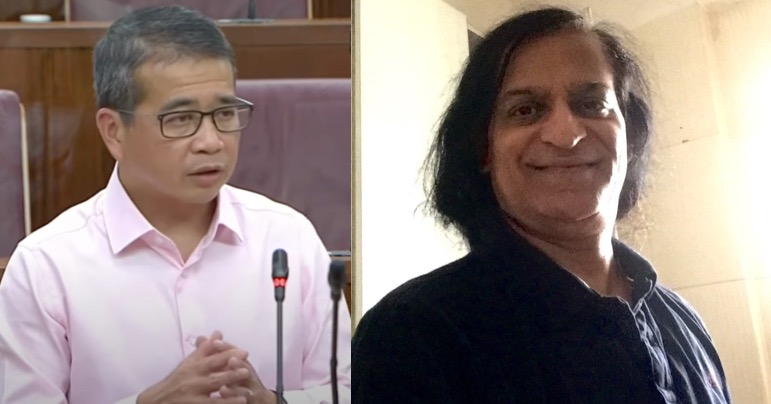Sometimes, asserting Singapore's rights and interests does not mean that legal action must be taken.
This point was made by culture, community and youth minister Edwin Tong in Parliament on April 5, in response to a question from Leong Mun Wai of the Progress Singapore Party.
Leong was asking about the case of Joey Mendoza, who claimed that he had written a song that sounded very similar to the national day classic, "Count On Me Singapore".
Mendoza said he wrote the song before Hugh Harrison composed it in 1986.
However, Mendoza subsequently withdrew all his claims and apologised, and acknowledged that the Singapore government is the copyright holder.
Why not press the issue further: Leong Mun Wai
However, Leong asked why further action was not taken. He asked:
"After we've done our check on our rights, why didn't we actually press the issue further and ask him to admit plagiarism, rather than just letting him go like that?"
He added that as Singapore is aiming to become a global arbitration centre, such infringements of Intellectual Property rights may affect those aspirations.
In response, Tong explained that the Ministry of Culture, Community and Youth did assert its copyright and ownership interests when it pressed Mendoza to come up with evidence to substantiate his claims.
Mendoza could not, and then withdrew the claims.
Tong explained:
"Mr Leong should not also confuse asserting our rights with necessarily taking legal action, legal proceedings. They are not necessarily the same thing.
And in this case, it was far more efficient, quicker, a lot more effective for Mr Mendoza to be persuaded that his own position was untenable, for his claims to be withdrawn by himself and not in anyway removing the Singapore government, and in fact all Singaporeans' interests in the song, to be preserved."
Tong added that the outcome here was more efficient as opposed to a protracted legal conflict, which could take a much longer period.
Not disrespectful
Earlier, Tong made a distinction between schoolchildren in India singing "We Can Achieve", and Mendoza's claims.
Tong said that the students singing in the videos appear to be expressing their love for their country, and were not treating the song disrespectfully.
After the publisher of the song "We Can Achieve" was informed of the close similarity, they apologised and took down the song.
"We did not believe there was any ill-will or malice intended, and hence accepted (the) apology," Tong said.
However, the ministry takes any challenge to its proprietary rights and interests in national songs, or symbols, very seriously.
Permission needs to be sought from government: Gerald Giam asks for clarification
Gerald Giam of the Workers' Party asked if Tong could confirm that the government holds exclusive copyrights to all national songs, given that many different composers working for different advertising agencies are contracted to come up with them.
He also asked if this meant that people who wanted to perform such works needed to seek permission from the government, whether they are here in Singapore or overseas.
Tong replied that such permission must be sought.
As for songs composed by third parties, the copyright is either owned by the government or managed by the government.
Top image from Joey Mendoza's Facebook page and CNA's YouTube channel.
If you like what you read, follow us on Facebook, Instagram, Twitter and Telegram to get the latest updates.
